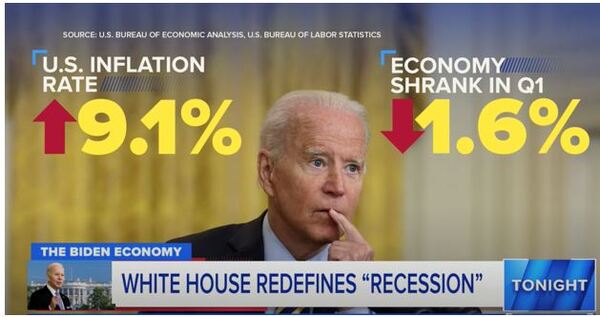
–>
August 1, 2022
Broadly speaking, a period of slow or negative economic GROWTH, usually accompanied by rising UNEMPLOYMENT. Economists have two more precise definitions of a recession. The first, which can be hard to prove, is when an economy is growing at less than its long-term trend rate of growth and has spare CAPACITY. The second is two consecutive quarters of falling GDP.
There is no official definition of recession, but there is general recognition that the term refers to a period of decline in economic activity. Very short periods of decline are not considered recessions. Most commentators and analysts use, as a practical definition of recession, two consecutive quarters of decline in a country’s real (inflation-adjusted) gross domestic product (GDP) — the value of all goods and services a country produces.

How convenient. The Biden administration is presiding over the worst economy that most Americans ever lived through, with true inflation, as in food and energy costs, pushing 20 percent, along with a shrinking economy. There is a term for this, stagflation, that hasn’t been uttered since the Carter presidency in the late 1970s.
‘); googletag.cmd.push(function () { googletag.display(‘div-gpt-ad-1609268089992-0’); }); }
President Biden and his handlers are trying to avoid that label being attached to their regime. Especially ahead of the midterm elections. How? By simply denying the obvious. Treasury Secretary Janet Yellen said: “This is not an economy in recession.” Instead, she says, “We’re in a period of transition.” Remember when she said inflation would be “transitory”?
White House advisor Brian Deese won’t use that dreaded ‘R’ word either, declaring that the U.S. economy is in a “period of transition”. Instead of stagflation, he claims America is now in, “a period of stable and resilient growth.” The administration must have conducted focus groups who much preferred “transition” to “recession.”
Wikipedia can’t decide what a recession is either, altering the definition 47 times over a 24-hour period after the Biden administration furiously tried to change the accepted definition.
‘); googletag.cmd.push(function () { googletag.display(‘div-gpt-ad-1609270365559-0’); }); }
Yet Wikipedia acknowledges that for quantitative science, like mathematics or economics, precision is necessary: “In mathematics, a definition is used to give a precise meaning to a new term, by describing a condition which unambiguously qualifies what a mathematical term is and is not.”
Imagine if this occurred on President Trump’s watch. Would we have situational or fluid definitions? Fat chance.
MarketWatch, in the Spring of 2020, reporting on the Trump recession noted: “A recession is typically defined as two straight quarters of negative GDP.” CNBC agreed, “As a rule of thumb, recessions are thought to entail two consecutive quarters of negative GDP growth.”
But with a Democrat in the White House, it’s time to redefine things in a light more favorable to those in charge. The media believes the obvious recession is not a recession if they say otherwise.
What else have Democrats and the left redefined? The longstanding definition of vaccine changed during the COVID pandemic. The CDC made this change from: “The act of introducing a vaccine into the body to produce immunity to a specific disease.” Now, the word “immunity” has been switched to “protection.”
Why? Because the vaccines did not provide immunity to COVID, as evidenced by quadruple vaccinated President Biden recently diagnosed with COVID, recovering and then getting COVID again a week later. Or the high number of COVID cases in countries where most of the population has been vaxxed and boosted. When the definition doesn’t fit the facts, change the definition, just like with recession.
‘); googletag.cmd.push(function () { googletag.display(‘div-gpt-ad-1609268078422-0’); }); } if (publir_show_ads) { document.write(“
‘Woman’ is another word that has never been in dispute, easily defined based on genetics and anatomy. I don’t recall there ever being a question about defining man and woman, ever since the first pages of the Bible describing Adam and Eve in the Garden of Eden.
Yet now the definition of “woman” is in question. A recent nominee to the U.S. Supreme Court, Judge Ketanji Brown Jackson, couldn’t define ‘woman.’ Yet she was deemed capable of sitting on the highest court.
Remember two summers ago when American city riots and rampant property destruction were described as “peaceful protests”? Or when an open southern border, through which millions of illegal immigrants pass each year, is called “secure” by the DHS chief charged with securing and enforcing our border?
An ”illegal alien” is now an “undocumented worker.” “They” used to refer to a group of people; now it describes someone whose proclaimed gender is not the traditional male or female. A biological male college swimmer was nominated for NCAA woman of the year. “Pedophile” or “groomer” is now a “minor-attracted person.”
Then there are the epithets. Terms like ‘racist,’ ‘Nazi,’ and ‘white supremacist’ all have definitions.
To Democrats and their media supporters, these terms now apply to anyone who disagrees with them or their progressive ideas or agenda.
Situational definitions are convenient when the fact doesn’t fit one’s preferred narrative. The White House spiel is that the U.S. economy is the “strongest in history” when it painfully obvious to most Americans that it’s quite the opposite. Therefore, inflation becomes “transient” when it’s not, and a recession, as traditionally defined, is simply some type of transition and not really a recession.
Perhaps the left is channeling Ben Kenobi from Star Wars, telling the sand trooper that: “These aren’t the droids you’re looking for.”
While CNN viewers may swallow that hook, line, and sinker, most Americans don’t.
Democrats and the media can attempt to spin the recession as rainbows and unicorns, using pretzel logic and silly talk, but those in the real world, buying groceries and gasoline, paying their daily bills, watching businesses struggle and close, know better.
We define words for a reason, to provide clarity and precision. Unfortunately, the left wants to define everything as it chooses, a state of anarchy where reality is determined by those in charge. How Orwellian.
Brian C. Joondeph, M.D., is a physician and writer. Follow me on Twitter @retinaldoctor, on Truth Social @BrianJoondeph, and on LinkedIn @Brian Joondeph.
<!– if(page_width_onload <= 479) { document.write("
“); googletag.cmd.push(function() { googletag.display(‘div-gpt-ad-1345489840937-4’); }); } –> If you experience technical problems, please write to [email protected]
FOLLOW US ON
<!–
–>
<!– _qoptions={ qacct:”p-9bKF-NgTuSFM6″ }; ![]() –> <!—-> <!– var addthis_share = { email_template: “new_template” } –>
–> <!—-> <!– var addthis_share = { email_template: “new_template” } –>







